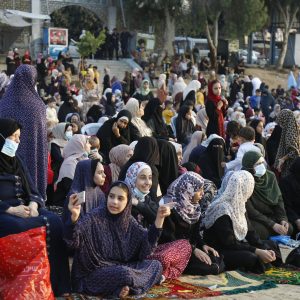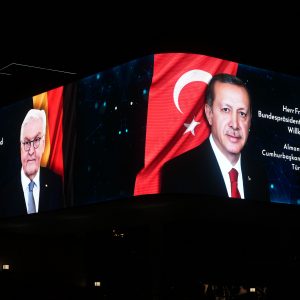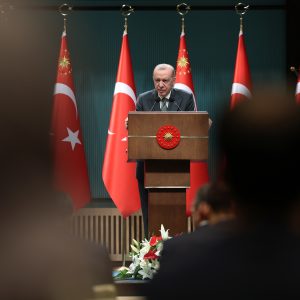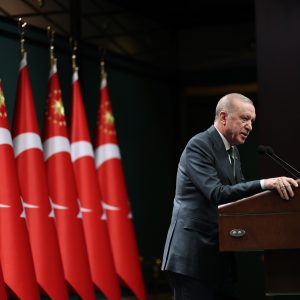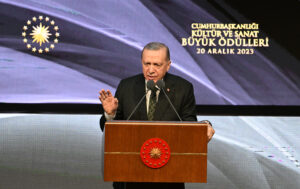Western media’s language, narrative erase Israel’s responsibility, says Palestinian American journalist
ISTANBUL (AA) – The language and narrative used in the Western media’s coverage of Palestine over the years has been an effort to legitimize Israel’s crimes, says Ali Abunimah, a renowned Palestinian-American journalist.
The founder of the Electronic Intifada website, Abunimah said that the mainstream media’s use of passive language conceals Israel’s crimes and aims to relieve the country of its responsibilities.
“This language poses the Palestinians as the problem, as an obstacle, and as something that has to be solved. The problem is not Palestinians or Palestine, but Zionism, Israeli occupation, oppression, apartheid, colonization, and now genocide. We have to be very clear about that.
“I would say ‘the question of Israel,’ ‘the question of Zionism,’ ‘the Israeli problem,’ or the ‘Zionism problem.’”
He added that in the media language, common expressions used to describe Palestinian actions include words like “terrorists,” “militants,” and “rocket attacks” while Israeli actions are often peddled as “self-defense” and “retaliation.”
“Palestine is a country that has been invaded and colonized. So, the very existence of the Israeli colonial state is an aggression. So, the idea that an aggressor, an occupier can defend itself is ridiculous to begin with.
“They portray Israel as the victim and the Palestinians as the aggressor, and they allow Israel to describe Palestinians as engaging in so-called terrorism,” said Abunimah.
“But of course, this language is designed to demonize Palestinians and falsely portray Israel as a victim, defending itself,” he added.
Emphasizing that the word “terrorism” has been highly politicized, notably in recent years, Abunimah said that the term is never used to describe an action, it is used to describe who is carrying out the action.
“This is why they use it against Palestinians and other oppressed groups. Whereas the same actions, or much worse actions, when they are carried out by Israel or by the United States or by other powerful forces, are never described as terrorism,” he said.
He added that the Palestinians are engaged in legitimate resistance and self-defense and that the word “terrorism” has no place in describing what Palestinians do.
“It might be a good term for what Israel is doing, although Israel is doing much worse than terrorism,” said Abunimah.
He pointed out that Israel is settling more and more Jews in the occupied Palestinian territories, and said: “Imagine I invade your house. Heaven forbid, I attack you or members of your family and you defend yourself. Of course, it would be nonsense to talk about you carrying out an aggression against me.”
– Context removed –
“In your own house, you are defending yourself, you are defending your life and you are defending your property. I can’t accuse you of attacking me. This context is usually removed from Western media coverage,” he added.
He underlined that the term “relocation” is often used in media reports about the Palestinian exodus, noting that this implies a voluntary act of relocation, and said: “What we’re seeing is ethnic cleansing, what we’re seeing is expulsion, what we’re seeing is forced displacement.”
“We see the news media, particularly in the West, always trying to use terms that trivialize what is going on there. A term like ‘relocation’ is designed to obscure who is doing what to whom.
“Whether you point a gun at someone and tell them to leave, or you destroy the ability of a society to function by destroying its schools, hospitals, and farms the result is the same — ethnic cleansing,” he added.
He pointed out that the 708-kilometer-long “separation wall” in the West Bank is called a “security barrier” by the Israeli government and many media organizations but disagreed. “It is definitely not a security barrier. It is a separation wall but we have to be very clear about what it is separating.
“Mostly it is separating Palestinians from each other and from their own land.”
He underlined that in this way, Palestinians living in villages are cut off from the towns.
He noted that another common phrase used in the media, especially after October 7, is “Israeli-Palestinian war.”
“This is genocide first and foremost. What the Israeli army is doing is deliberately killing the Palestinian population through direct bombardment, starvation, blockade, and destruction of all the elements of life. So, this is a real genocide in the most direct meaning of the word,” he said.
Adding that Israel is targeting civilians by disregarding the rules of war, he said: “But within that, Palestinians are engaging in a guerilla war to defend their people, to liberate their people, to resist this genocide.
“So, that is important because we don’t want to lose sight of the fact that the Palestinians are trying, even though they do not have the same level of military equipment and capacity and of course, they don’t have the support of the United States, Europe, and so on. They are still defending themselves as best they can.”
– Erases Israel’s responsibility –
Underscoring that the Western media uses passive language to justify Israel’s arguments, Abunimah said: “I think one of the tactics that we see all the time in the Western media is to use language which erases Israel’s responsibility.
“For example, instead of saying ‘Israel bombs a refugee camp and kills 45 people,’ they would say something like ‘45 Palestinians die in an explosion.’ So, you would read that and you’d say they died as if it was natural. They don’t say who did it. You see this phenomenon all the time in the Western media.”
Since last October 7, Israel has killed more than 37,100 Palestinians in Gaza, most of them women and children, and injured nearly 84,700 others, according to local health authorities.
Eight months into the Israeli war, vast tracts of Gaza lie in ruins amid a crippling blockade of food, clean water, and medicine.
Israel stands accused of genocide at the International Court of Justice, whose latest ruling ordered Tel Aviv to immediately halt its operation in the southern city of Rafah, where over a million Palestinians had sought refuge from the war before it was invaded on May 6.




